Management and Operations Report: Leadership and Management Analysis
VerifiedAdded on 2023/01/11
|20
|6196
|29
Report
AI Summary
This report provides a comprehensive analysis of leadership and management within the context of operations, using Unilever as a case study. It defines and contrasts the roles and characteristics of leaders and managers, exploring how they apply in different situational contexts. The report delves into various leadership theories and models, including situational, systems, and contingency approaches, and examines key approaches to operations management. It assesses the importance of operations management in achieving business objectives, and how leaders and managers can improve operational efficiencies. Finally, the report evaluates the impact of the business environment on operational management and decision-making, offering a holistic view of effective leadership and management practices in a dynamic business setting.
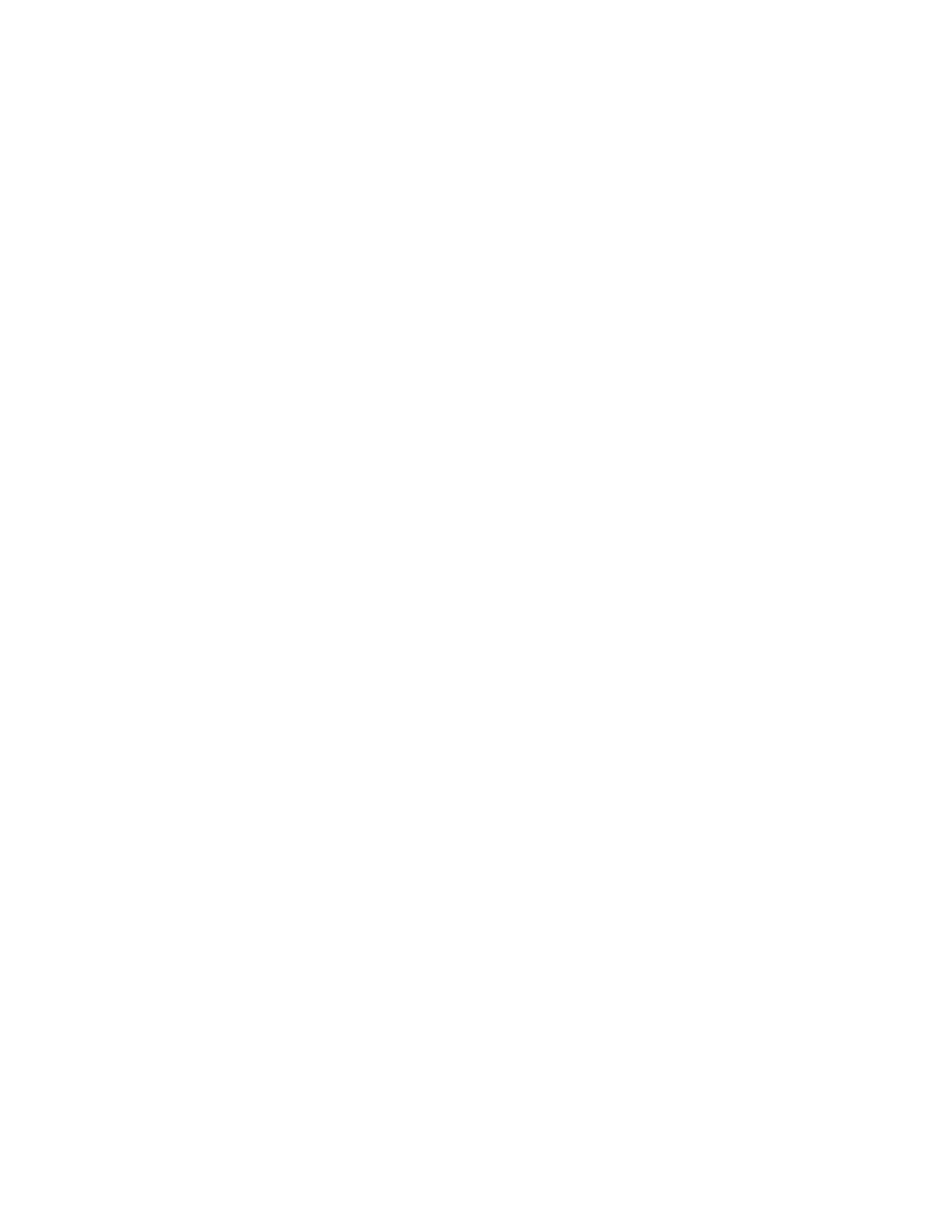
Paraphrase This Document
Need a fresh take? Get an instant paraphrase of this document with our AI Paraphraser
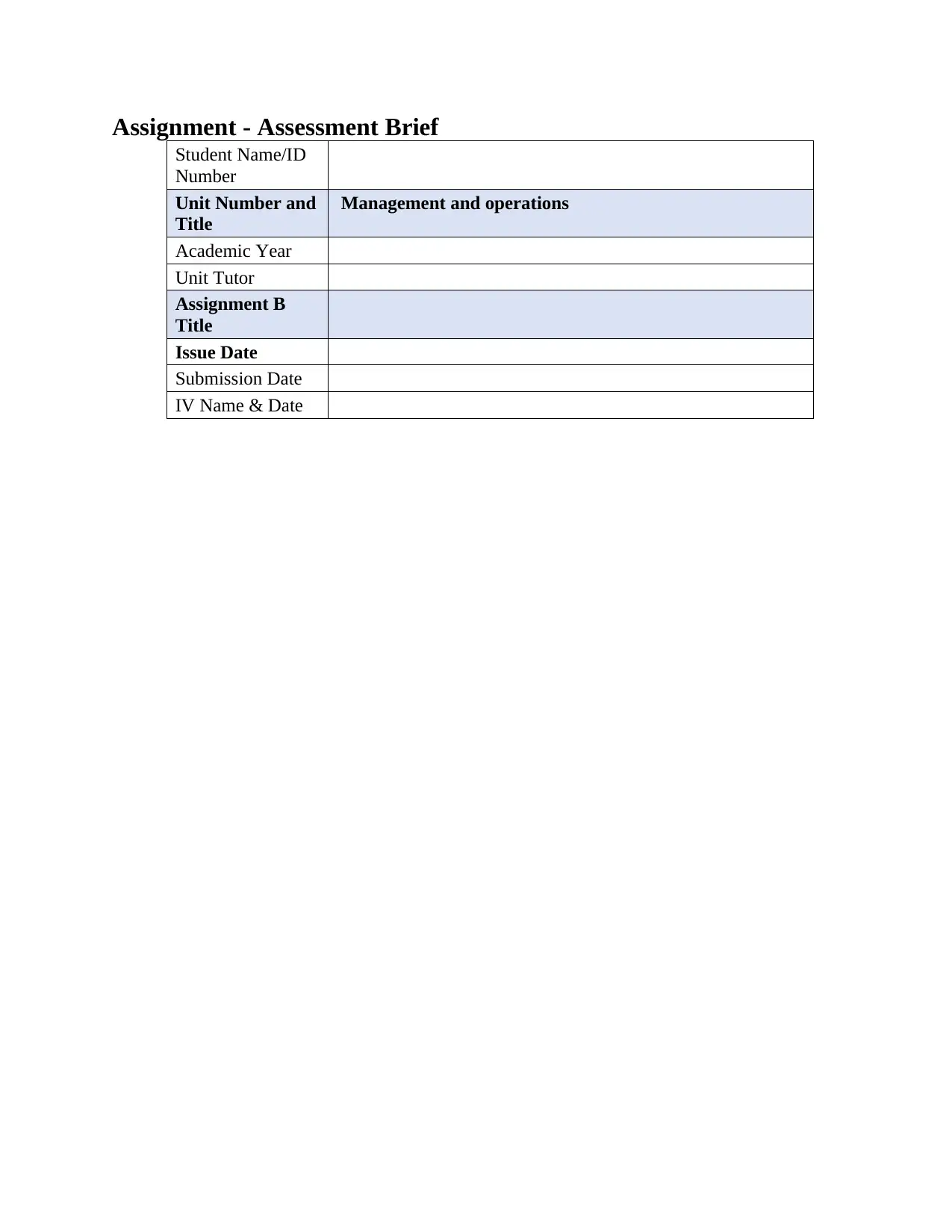
Assignment - Assessment Brief
Student Name/ID
Number
Unit Number and
Title
Management and operations
Academic Year
Unit Tutor
Assignment B
Title
Issue Date
Submission Date
IV Name & Date
Student Name/ID
Number
Unit Number and
Title
Management and operations
Academic Year
Unit Tutor
Assignment B
Title
Issue Date
Submission Date
IV Name & Date
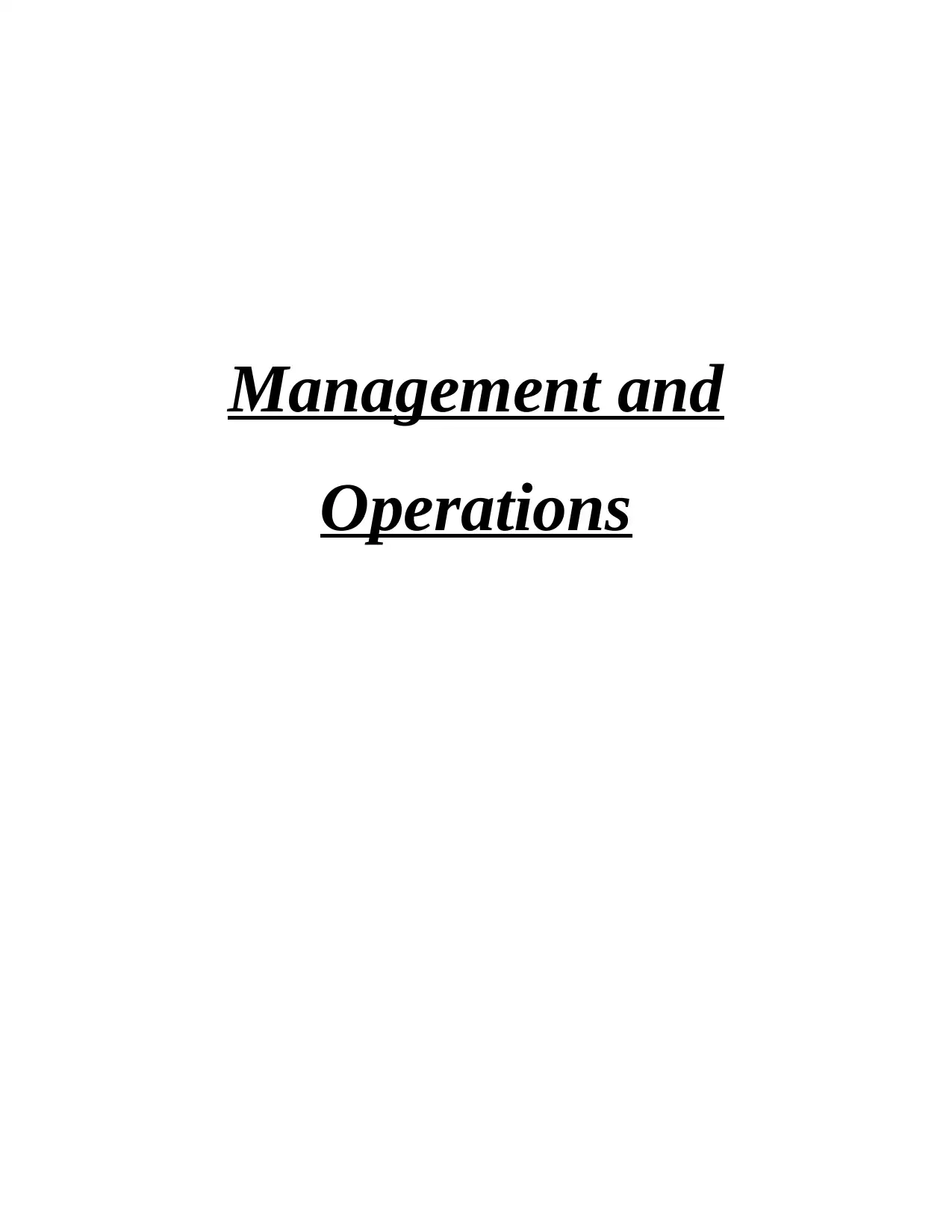
Management and
Operations
Operations
⊘ This is a preview!⊘
Do you want full access?
Subscribe today to unlock all pages.

Trusted by 1+ million students worldwide
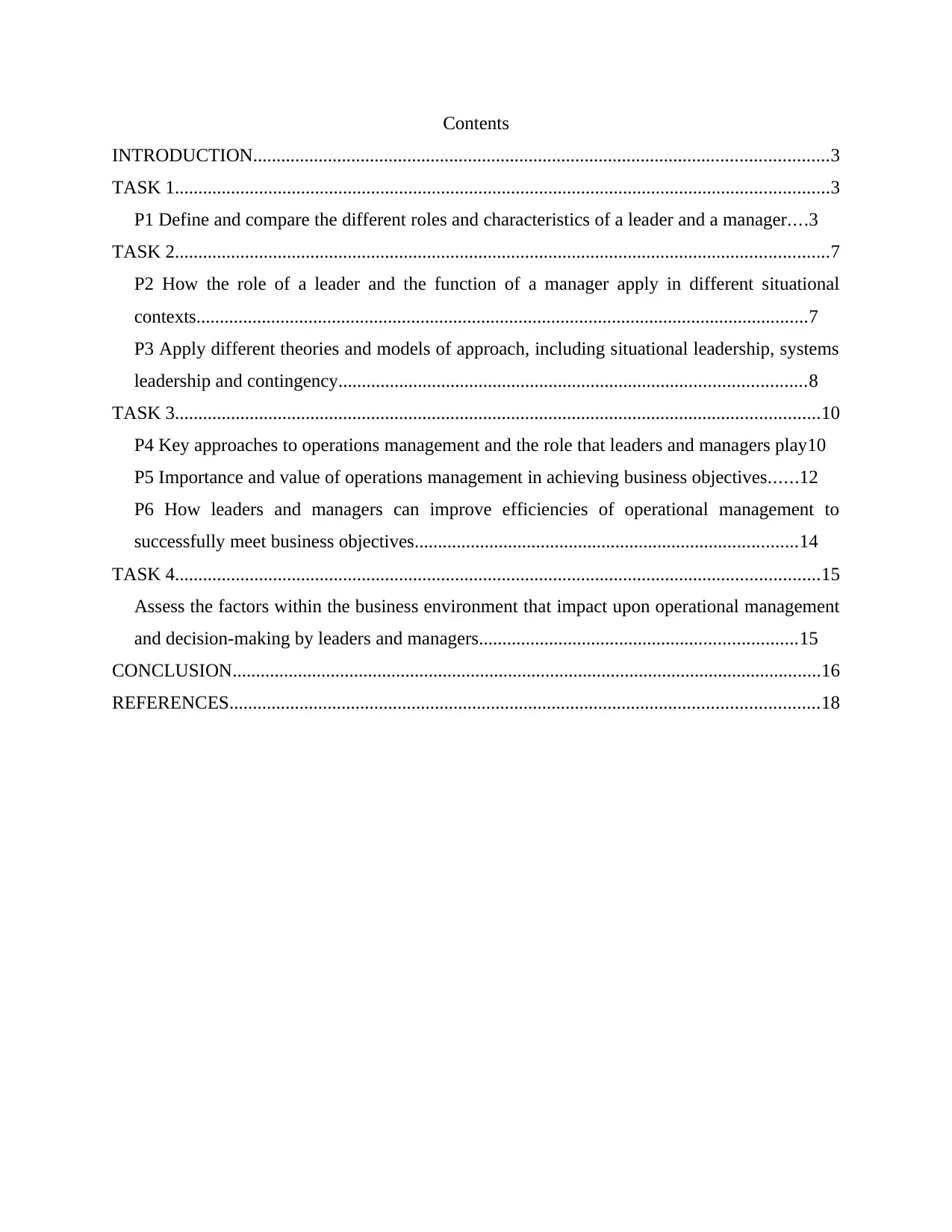
Contents
INTRODUCTION...........................................................................................................................3
TASK 1............................................................................................................................................3
P1 Define and compare the different roles and characteristics of a leader and a manager....3
TASK 2............................................................................................................................................7
P2 How the role of a leader and the function of a manager apply in different situational
contexts...................................................................................................................................7
P3 Apply different theories and models of approach, including situational leadership, systems
leadership and contingency....................................................................................................8
TASK 3..........................................................................................................................................10
P4 Key approaches to operations management and the role that leaders and managers play10
P5 Importance and value of operations management in achieving business objectives......12
P6 How leaders and managers can improve efficiencies of operational management to
successfully meet business objectives..................................................................................14
TASK 4..........................................................................................................................................15
Assess the factors within the business environment that impact upon operational management
and decision-making by leaders and managers....................................................................15
CONCLUSION..............................................................................................................................16
REFERENCES..............................................................................................................................18
INTRODUCTION...........................................................................................................................3
TASK 1............................................................................................................................................3
P1 Define and compare the different roles and characteristics of a leader and a manager....3
TASK 2............................................................................................................................................7
P2 How the role of a leader and the function of a manager apply in different situational
contexts...................................................................................................................................7
P3 Apply different theories and models of approach, including situational leadership, systems
leadership and contingency....................................................................................................8
TASK 3..........................................................................................................................................10
P4 Key approaches to operations management and the role that leaders and managers play10
P5 Importance and value of operations management in achieving business objectives......12
P6 How leaders and managers can improve efficiencies of operational management to
successfully meet business objectives..................................................................................14
TASK 4..........................................................................................................................................15
Assess the factors within the business environment that impact upon operational management
and decision-making by leaders and managers....................................................................15
CONCLUSION..............................................................................................................................16
REFERENCES..............................................................................................................................18
Paraphrase This Document
Need a fresh take? Get an instant paraphrase of this document with our AI Paraphraser
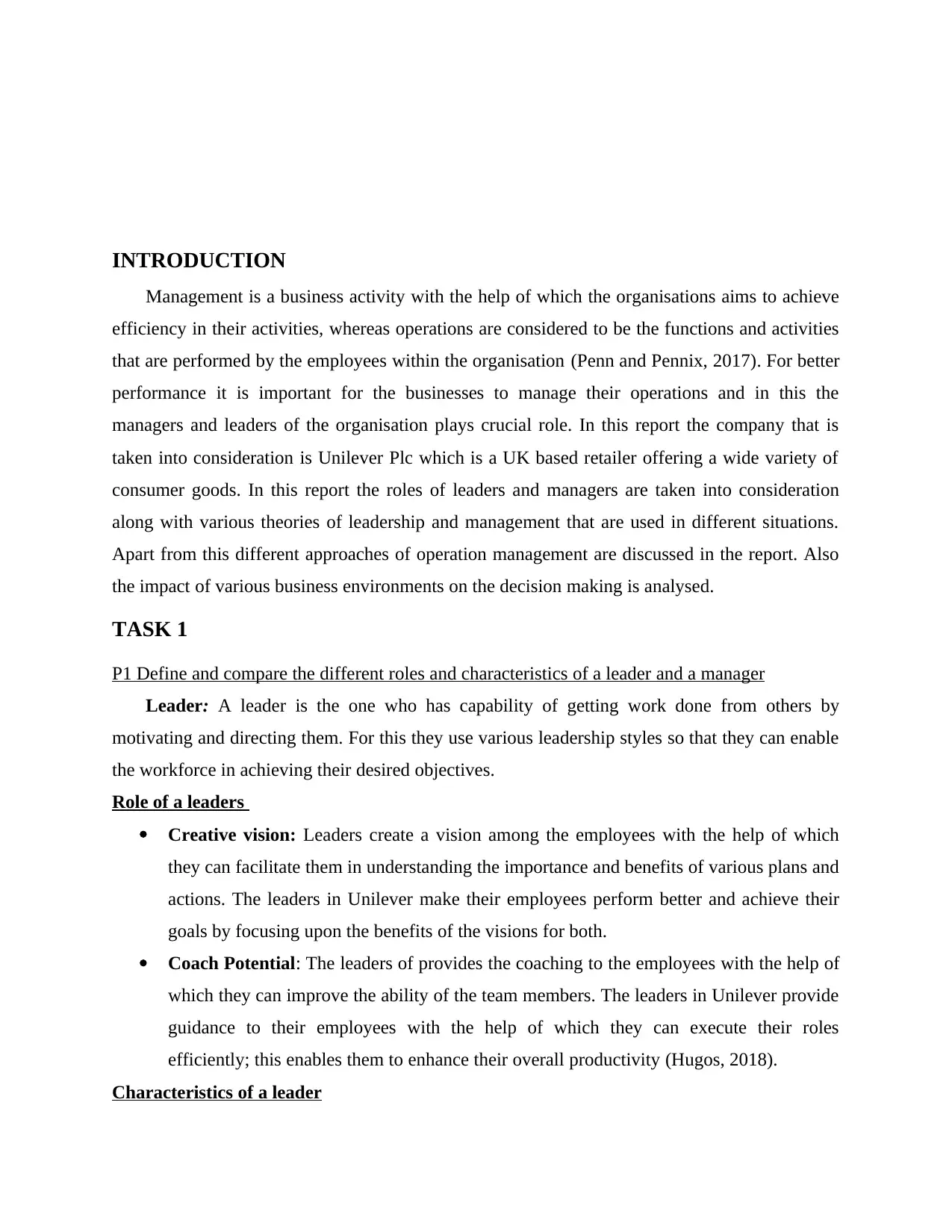
INTRODUCTION
Management is a business activity with the help of which the organisations aims to achieve
efficiency in their activities, whereas operations are considered to be the functions and activities
that are performed by the employees within the organisation (Penn and Pennix, 2017). For better
performance it is important for the businesses to manage their operations and in this the
managers and leaders of the organisation plays crucial role. In this report the company that is
taken into consideration is Unilever Plc which is a UK based retailer offering a wide variety of
consumer goods. In this report the roles of leaders and managers are taken into consideration
along with various theories of leadership and management that are used in different situations.
Apart from this different approaches of operation management are discussed in the report. Also
the impact of various business environments on the decision making is analysed.
TASK 1
P1 Define and compare the different roles and characteristics of a leader and a manager
Leader: A leader is the one who has capability of getting work done from others by
motivating and directing them. For this they use various leadership styles so that they can enable
the workforce in achieving their desired objectives.
Role of a leaders
Creative vision: Leaders create a vision among the employees with the help of which
they can facilitate them in understanding the importance and benefits of various plans and
actions. The leaders in Unilever make their employees perform better and achieve their
goals by focusing upon the benefits of the visions for both.
Coach Potential: The leaders of provides the coaching to the employees with the help of
which they can improve the ability of the team members. The leaders in Unilever provide
guidance to their employees with the help of which they can execute their roles
efficiently; this enables them to enhance their overall productivity (Hugos, 2018).
Characteristics of a leader
Management is a business activity with the help of which the organisations aims to achieve
efficiency in their activities, whereas operations are considered to be the functions and activities
that are performed by the employees within the organisation (Penn and Pennix, 2017). For better
performance it is important for the businesses to manage their operations and in this the
managers and leaders of the organisation plays crucial role. In this report the company that is
taken into consideration is Unilever Plc which is a UK based retailer offering a wide variety of
consumer goods. In this report the roles of leaders and managers are taken into consideration
along with various theories of leadership and management that are used in different situations.
Apart from this different approaches of operation management are discussed in the report. Also
the impact of various business environments on the decision making is analysed.
TASK 1
P1 Define and compare the different roles and characteristics of a leader and a manager
Leader: A leader is the one who has capability of getting work done from others by
motivating and directing them. For this they use various leadership styles so that they can enable
the workforce in achieving their desired objectives.
Role of a leaders
Creative vision: Leaders create a vision among the employees with the help of which
they can facilitate them in understanding the importance and benefits of various plans and
actions. The leaders in Unilever make their employees perform better and achieve their
goals by focusing upon the benefits of the visions for both.
Coach Potential: The leaders of provides the coaching to the employees with the help of
which they can improve the ability of the team members. The leaders in Unilever provide
guidance to their employees with the help of which they can execute their roles
efficiently; this enables them to enhance their overall productivity (Hugos, 2018).
Characteristics of a leader
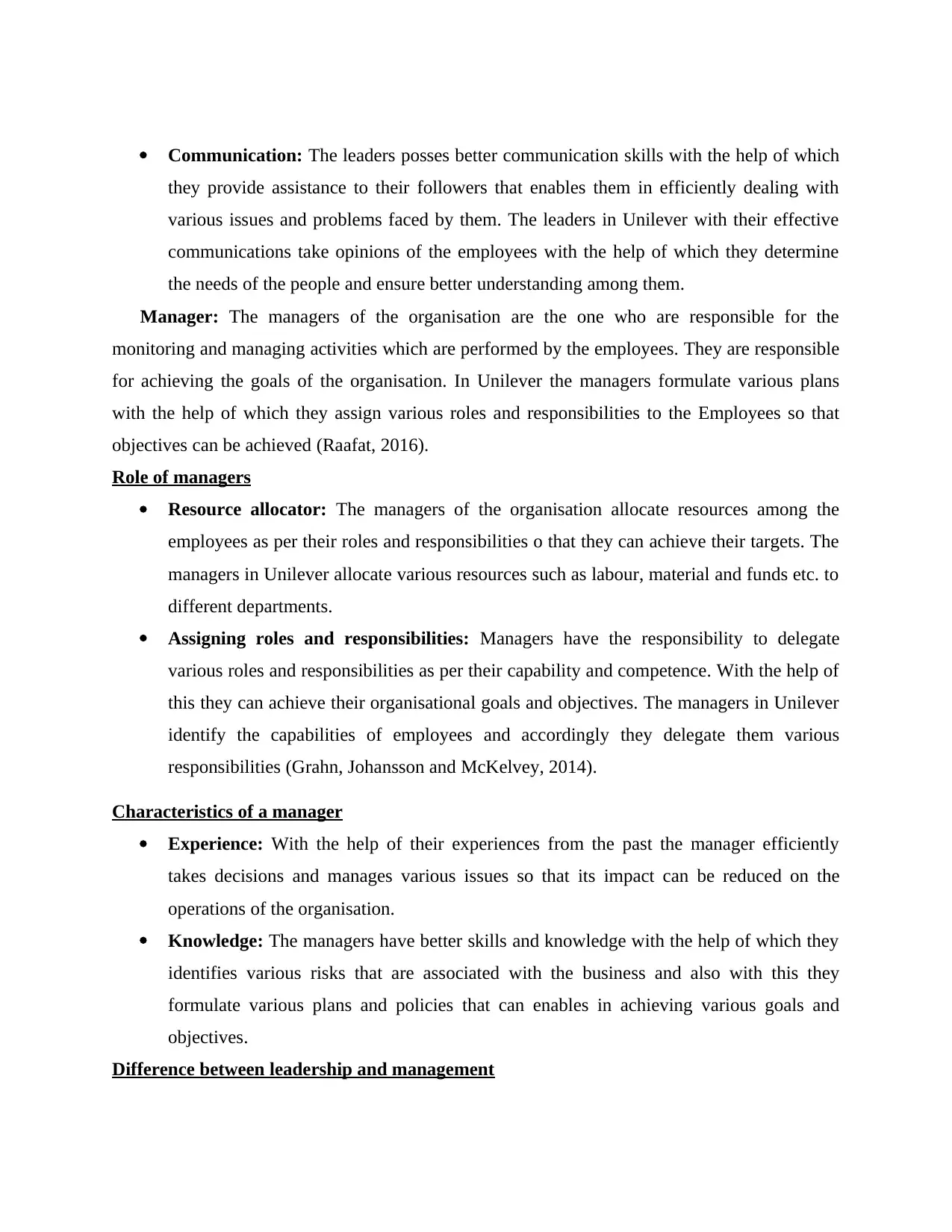
Communication: The leaders posses better communication skills with the help of which
they provide assistance to their followers that enables them in efficiently dealing with
various issues and problems faced by them. The leaders in Unilever with their effective
communications take opinions of the employees with the help of which they determine
the needs of the people and ensure better understanding among them.
Manager: The managers of the organisation are the one who are responsible for the
monitoring and managing activities which are performed by the employees. They are responsible
for achieving the goals of the organisation. In Unilever the managers formulate various plans
with the help of which they assign various roles and responsibilities to the Employees so that
objectives can be achieved (Raafat, 2016).
Role of managers
Resource allocator: The managers of the organisation allocate resources among the
employees as per their roles and responsibilities o that they can achieve their targets. The
managers in Unilever allocate various resources such as labour, material and funds etc. to
different departments.
Assigning roles and responsibilities: Managers have the responsibility to delegate
various roles and responsibilities as per their capability and competence. With the help of
this they can achieve their organisational goals and objectives. The managers in Unilever
identify the capabilities of employees and accordingly they delegate them various
responsibilities (Grahn, Johansson and McKelvey, 2014).
Characteristics of a manager
Experience: With the help of their experiences from the past the manager efficiently
takes decisions and manages various issues so that its impact can be reduced on the
operations of the organisation.
Knowledge: The managers have better skills and knowledge with the help of which they
identifies various risks that are associated with the business and also with this they
formulate various plans and policies that can enables in achieving various goals and
objectives.
Difference between leadership and management
they provide assistance to their followers that enables them in efficiently dealing with
various issues and problems faced by them. The leaders in Unilever with their effective
communications take opinions of the employees with the help of which they determine
the needs of the people and ensure better understanding among them.
Manager: The managers of the organisation are the one who are responsible for the
monitoring and managing activities which are performed by the employees. They are responsible
for achieving the goals of the organisation. In Unilever the managers formulate various plans
with the help of which they assign various roles and responsibilities to the Employees so that
objectives can be achieved (Raafat, 2016).
Role of managers
Resource allocator: The managers of the organisation allocate resources among the
employees as per their roles and responsibilities o that they can achieve their targets. The
managers in Unilever allocate various resources such as labour, material and funds etc. to
different departments.
Assigning roles and responsibilities: Managers have the responsibility to delegate
various roles and responsibilities as per their capability and competence. With the help of
this they can achieve their organisational goals and objectives. The managers in Unilever
identify the capabilities of employees and accordingly they delegate them various
responsibilities (Grahn, Johansson and McKelvey, 2014).
Characteristics of a manager
Experience: With the help of their experiences from the past the manager efficiently
takes decisions and manages various issues so that its impact can be reduced on the
operations of the organisation.
Knowledge: The managers have better skills and knowledge with the help of which they
identifies various risks that are associated with the business and also with this they
formulate various plans and policies that can enables in achieving various goals and
objectives.
Difference between leadership and management
⊘ This is a preview!⊘
Do you want full access?
Subscribe today to unlock all pages.

Trusted by 1+ million students worldwide
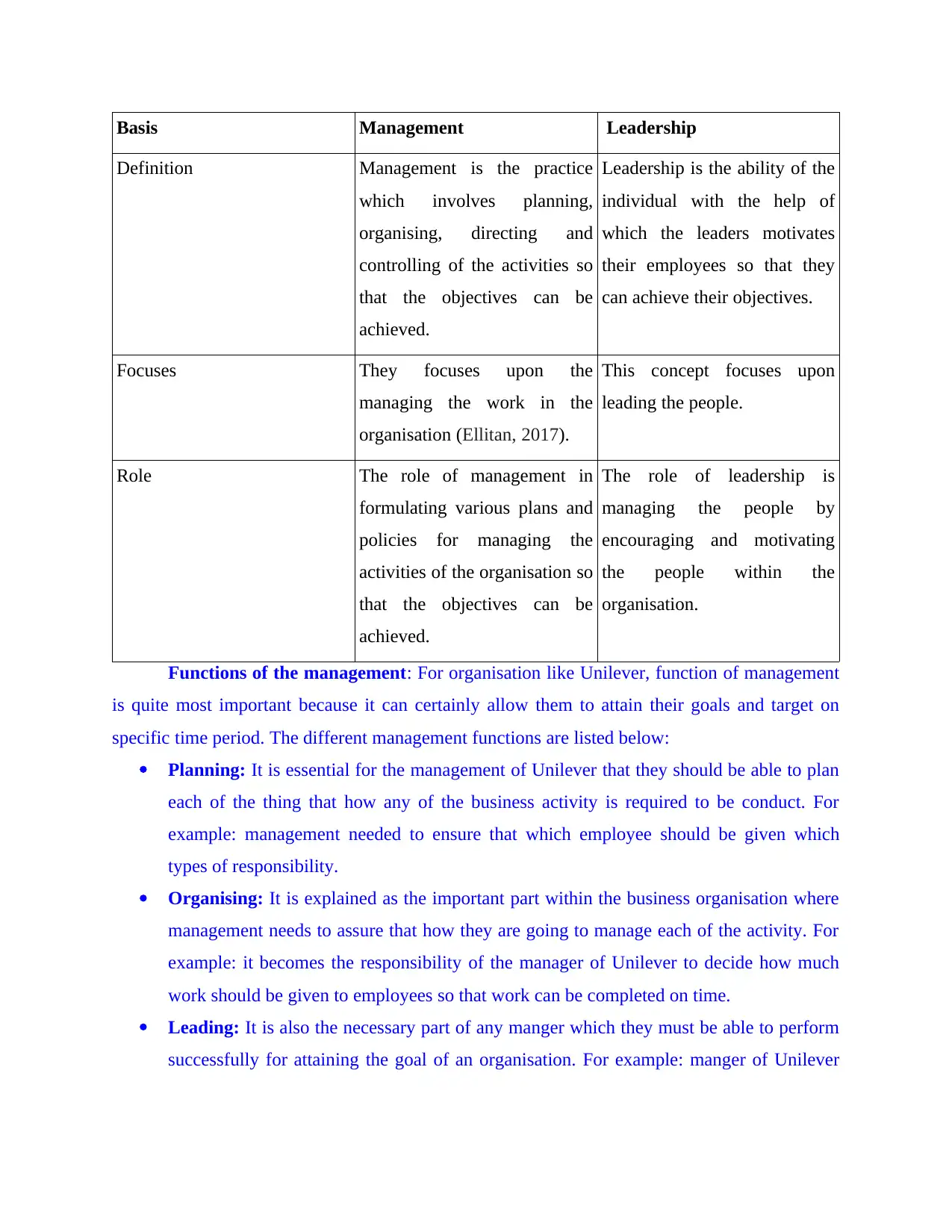
Basis Management Leadership
Definition Management is the practice
which involves planning,
organising, directing and
controlling of the activities so
that the objectives can be
achieved.
Leadership is the ability of the
individual with the help of
which the leaders motivates
their employees so that they
can achieve their objectives.
Focuses They focuses upon the
managing the work in the
organisation (Ellitan, 2017).
This concept focuses upon
leading the people.
Role The role of management in
formulating various plans and
policies for managing the
activities of the organisation so
that the objectives can be
achieved.
The role of leadership is
managing the people by
encouraging and motivating
the people within the
organisation.
Functions of the management: For organisation like Unilever, function of management
is quite most important because it can certainly allow them to attain their goals and target on
specific time period. The different management functions are listed below:
Planning: It is essential for the management of Unilever that they should be able to plan
each of the thing that how any of the business activity is required to be conduct. For
example: management needed to ensure that which employee should be given which
types of responsibility.
Organising: It is explained as the important part within the business organisation where
management needs to assure that how they are going to manage each of the activity. For
example: it becomes the responsibility of the manager of Unilever to decide how much
work should be given to employees so that work can be completed on time.
Leading: It is also the necessary part of any manger which they must be able to perform
successfully for attaining the goal of an organisation. For example: manger of Unilever
Definition Management is the practice
which involves planning,
organising, directing and
controlling of the activities so
that the objectives can be
achieved.
Leadership is the ability of the
individual with the help of
which the leaders motivates
their employees so that they
can achieve their objectives.
Focuses They focuses upon the
managing the work in the
organisation (Ellitan, 2017).
This concept focuses upon
leading the people.
Role The role of management in
formulating various plans and
policies for managing the
activities of the organisation so
that the objectives can be
achieved.
The role of leadership is
managing the people by
encouraging and motivating
the people within the
organisation.
Functions of the management: For organisation like Unilever, function of management
is quite most important because it can certainly allow them to attain their goals and target on
specific time period. The different management functions are listed below:
Planning: It is essential for the management of Unilever that they should be able to plan
each of the thing that how any of the business activity is required to be conduct. For
example: management needed to ensure that which employee should be given which
types of responsibility.
Organising: It is explained as the important part within the business organisation where
management needs to assure that how they are going to manage each of the activity. For
example: it becomes the responsibility of the manager of Unilever to decide how much
work should be given to employees so that work can be completed on time.
Leading: It is also the necessary part of any manger which they must be able to perform
successfully for attaining the goal of an organisation. For example: manger of Unilever
Paraphrase This Document
Need a fresh take? Get an instant paraphrase of this document with our AI Paraphraser
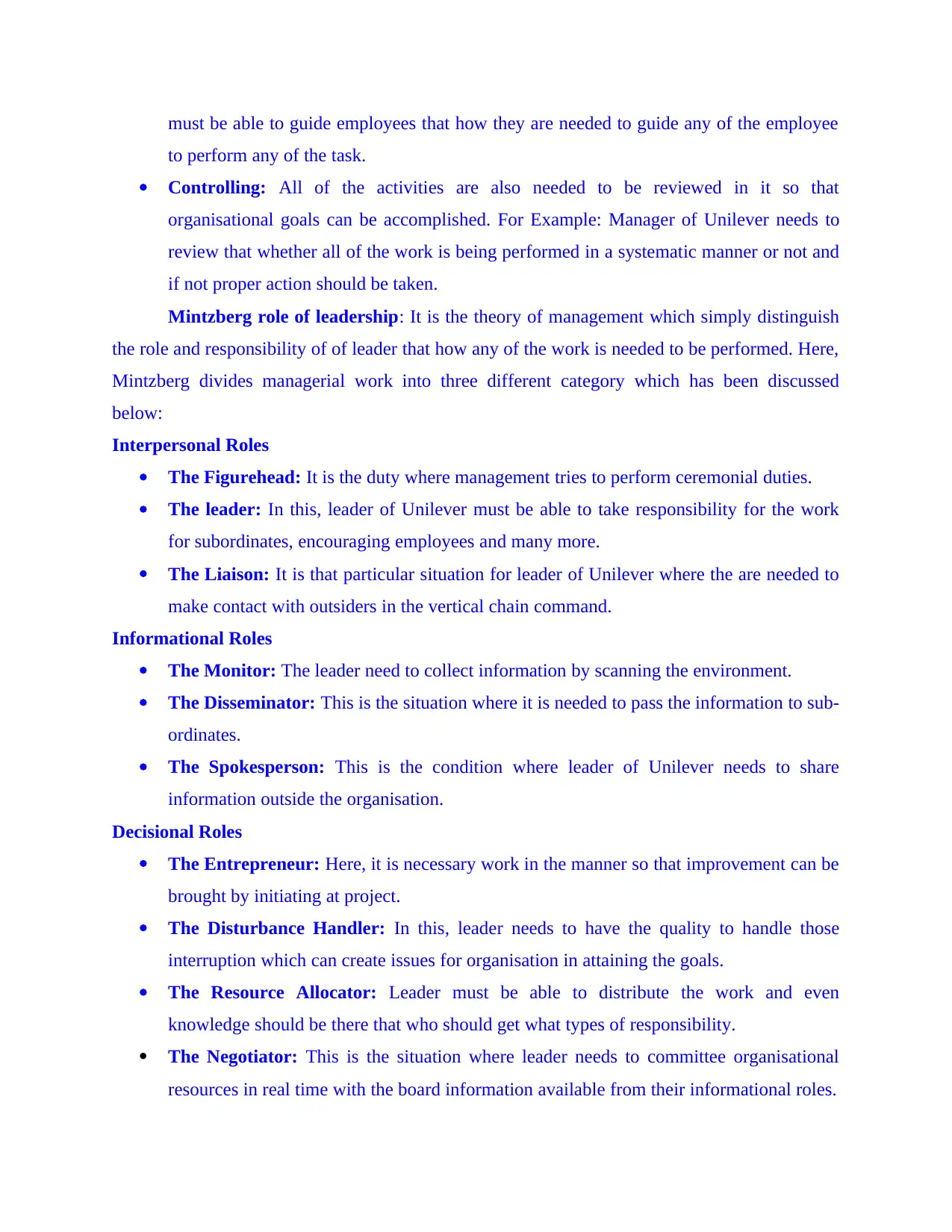
must be able to guide employees that how they are needed to guide any of the employee
to perform any of the task.
Controlling: All of the activities are also needed to be reviewed in it so that
organisational goals can be accomplished. For Example: Manager of Unilever needs to
review that whether all of the work is being performed in a systematic manner or not and
if not proper action should be taken.
Mintzberg role of leadership: It is the theory of management which simply distinguish
the role and responsibility of of leader that how any of the work is needed to be performed. Here,
Mintzberg divides managerial work into three different category which has been discussed
below:
Interpersonal Roles
The Figurehead: It is the duty where management tries to perform ceremonial duties.
The leader: In this, leader of Unilever must be able to take responsibility for the work
for subordinates, encouraging employees and many more.
The Liaison: It is that particular situation for leader of Unilever where the are needed to
make contact with outsiders in the vertical chain command.
Informational Roles
The Monitor: The leader need to collect information by scanning the environment.
The Disseminator: This is the situation where it is needed to pass the information to sub-
ordinates.
The Spokesperson: This is the condition where leader of Unilever needs to share
information outside the organisation.
Decisional Roles
The Entrepreneur: Here, it is necessary work in the manner so that improvement can be
brought by initiating at project.
The Disturbance Handler: In this, leader needs to have the quality to handle those
interruption which can create issues for organisation in attaining the goals.
The Resource Allocator: Leader must be able to distribute the work and even
knowledge should be there that who should get what types of responsibility.
The Negotiator: This is the situation where leader needs to committee organisational
resources in real time with the board information available from their informational roles.
to perform any of the task.
Controlling: All of the activities are also needed to be reviewed in it so that
organisational goals can be accomplished. For Example: Manager of Unilever needs to
review that whether all of the work is being performed in a systematic manner or not and
if not proper action should be taken.
Mintzberg role of leadership: It is the theory of management which simply distinguish
the role and responsibility of of leader that how any of the work is needed to be performed. Here,
Mintzberg divides managerial work into three different category which has been discussed
below:
Interpersonal Roles
The Figurehead: It is the duty where management tries to perform ceremonial duties.
The leader: In this, leader of Unilever must be able to take responsibility for the work
for subordinates, encouraging employees and many more.
The Liaison: It is that particular situation for leader of Unilever where the are needed to
make contact with outsiders in the vertical chain command.
Informational Roles
The Monitor: The leader need to collect information by scanning the environment.
The Disseminator: This is the situation where it is needed to pass the information to sub-
ordinates.
The Spokesperson: This is the condition where leader of Unilever needs to share
information outside the organisation.
Decisional Roles
The Entrepreneur: Here, it is necessary work in the manner so that improvement can be
brought by initiating at project.
The Disturbance Handler: In this, leader needs to have the quality to handle those
interruption which can create issues for organisation in attaining the goals.
The Resource Allocator: Leader must be able to distribute the work and even
knowledge should be there that who should get what types of responsibility.
The Negotiator: This is the situation where leader needs to committee organisational
resources in real time with the board information available from their informational roles.
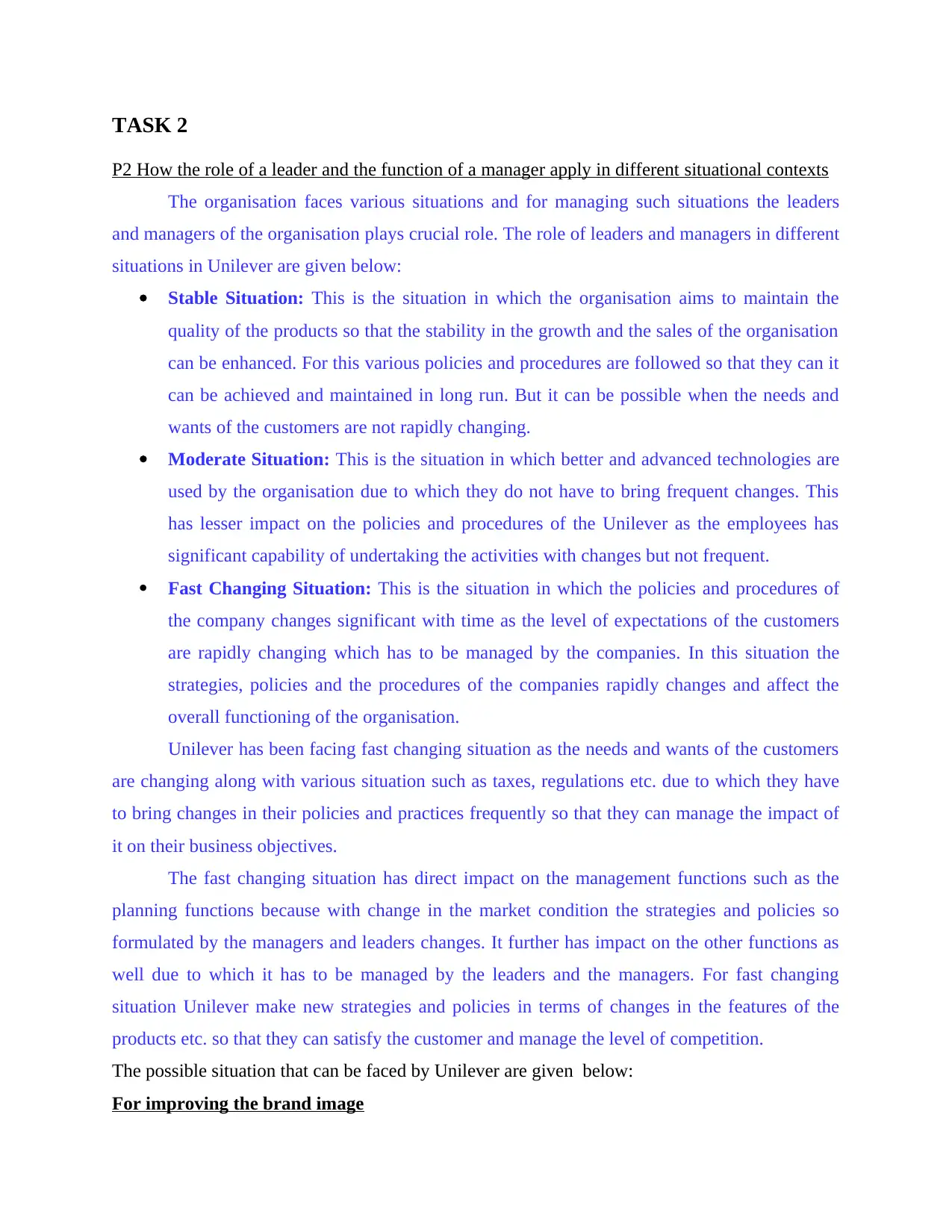
TASK 2
P2 How the role of a leader and the function of a manager apply in different situational contexts
The organisation faces various situations and for managing such situations the leaders
and managers of the organisation plays crucial role. The role of leaders and managers in different
situations in Unilever are given below:
Stable Situation: This is the situation in which the organisation aims to maintain the
quality of the products so that the stability in the growth and the sales of the organisation
can be enhanced. For this various policies and procedures are followed so that they can it
can be achieved and maintained in long run. But it can be possible when the needs and
wants of the customers are not rapidly changing.
Moderate Situation: This is the situation in which better and advanced technologies are
used by the organisation due to which they do not have to bring frequent changes. This
has lesser impact on the policies and procedures of the Unilever as the employees has
significant capability of undertaking the activities with changes but not frequent.
Fast Changing Situation: This is the situation in which the policies and procedures of
the company changes significant with time as the level of expectations of the customers
are rapidly changing which has to be managed by the companies. In this situation the
strategies, policies and the procedures of the companies rapidly changes and affect the
overall functioning of the organisation.
Unilever has been facing fast changing situation as the needs and wants of the customers
are changing along with various situation such as taxes, regulations etc. due to which they have
to bring changes in their policies and practices frequently so that they can manage the impact of
it on their business objectives.
The fast changing situation has direct impact on the management functions such as the
planning functions because with change in the market condition the strategies and policies so
formulated by the managers and leaders changes. It further has impact on the other functions as
well due to which it has to be managed by the leaders and the managers. For fast changing
situation Unilever make new strategies and policies in terms of changes in the features of the
products etc. so that they can satisfy the customer and manage the level of competition.
The possible situation that can be faced by Unilever are given below:
For improving the brand image
P2 How the role of a leader and the function of a manager apply in different situational contexts
The organisation faces various situations and for managing such situations the leaders
and managers of the organisation plays crucial role. The role of leaders and managers in different
situations in Unilever are given below:
Stable Situation: This is the situation in which the organisation aims to maintain the
quality of the products so that the stability in the growth and the sales of the organisation
can be enhanced. For this various policies and procedures are followed so that they can it
can be achieved and maintained in long run. But it can be possible when the needs and
wants of the customers are not rapidly changing.
Moderate Situation: This is the situation in which better and advanced technologies are
used by the organisation due to which they do not have to bring frequent changes. This
has lesser impact on the policies and procedures of the Unilever as the employees has
significant capability of undertaking the activities with changes but not frequent.
Fast Changing Situation: This is the situation in which the policies and procedures of
the company changes significant with time as the level of expectations of the customers
are rapidly changing which has to be managed by the companies. In this situation the
strategies, policies and the procedures of the companies rapidly changes and affect the
overall functioning of the organisation.
Unilever has been facing fast changing situation as the needs and wants of the customers
are changing along with various situation such as taxes, regulations etc. due to which they have
to bring changes in their policies and practices frequently so that they can manage the impact of
it on their business objectives.
The fast changing situation has direct impact on the management functions such as the
planning functions because with change in the market condition the strategies and policies so
formulated by the managers and leaders changes. It further has impact on the other functions as
well due to which it has to be managed by the leaders and the managers. For fast changing
situation Unilever make new strategies and policies in terms of changes in the features of the
products etc. so that they can satisfy the customer and manage the level of competition.
The possible situation that can be faced by Unilever are given below:
For improving the brand image
⊘ This is a preview!⊘
Do you want full access?
Subscribe today to unlock all pages.

Trusted by 1+ million students worldwide
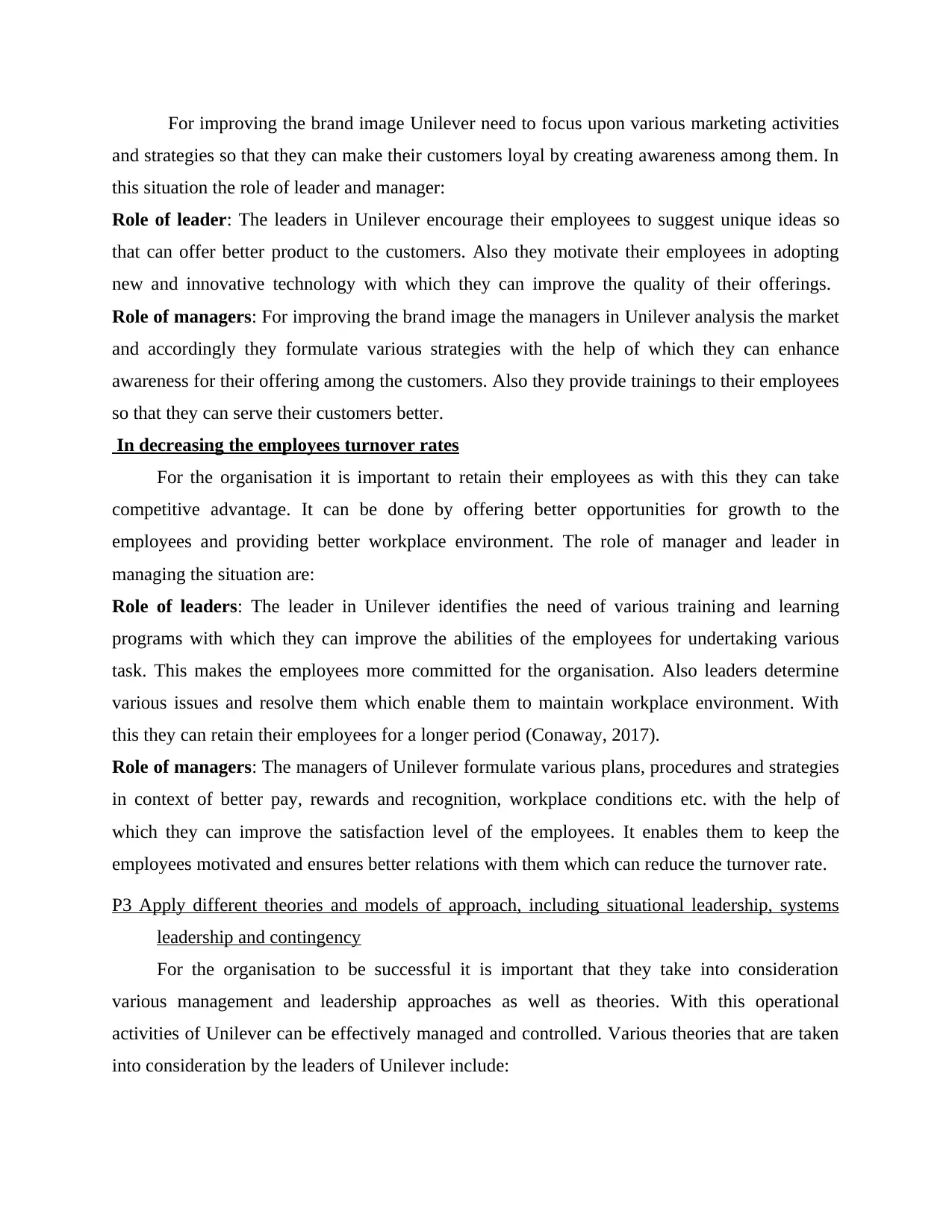
For improving the brand image Unilever need to focus upon various marketing activities
and strategies so that they can make their customers loyal by creating awareness among them. In
this situation the role of leader and manager:
Role of leader: The leaders in Unilever encourage their employees to suggest unique ideas so
that can offer better product to the customers. Also they motivate their employees in adopting
new and innovative technology with which they can improve the quality of their offerings.
Role of managers: For improving the brand image the managers in Unilever analysis the market
and accordingly they formulate various strategies with the help of which they can enhance
awareness for their offering among the customers. Also they provide trainings to their employees
so that they can serve their customers better.
In decreasing the employees turnover rates
For the organisation it is important to retain their employees as with this they can take
competitive advantage. It can be done by offering better opportunities for growth to the
employees and providing better workplace environment. The role of manager and leader in
managing the situation are:
Role of leaders: The leader in Unilever identifies the need of various training and learning
programs with which they can improve the abilities of the employees for undertaking various
task. This makes the employees more committed for the organisation. Also leaders determine
various issues and resolve them which enable them to maintain workplace environment. With
this they can retain their employees for a longer period (Conaway, 2017).
Role of managers: The managers of Unilever formulate various plans, procedures and strategies
in context of better pay, rewards and recognition, workplace conditions etc. with the help of
which they can improve the satisfaction level of the employees. It enables them to keep the
employees motivated and ensures better relations with them which can reduce the turnover rate.
P3 Apply different theories and models of approach, including situational leadership, systems
leadership and contingency
For the organisation to be successful it is important that they take into consideration
various management and leadership approaches as well as theories. With this operational
activities of Unilever can be effectively managed and controlled. Various theories that are taken
into consideration by the leaders of Unilever include:
and strategies so that they can make their customers loyal by creating awareness among them. In
this situation the role of leader and manager:
Role of leader: The leaders in Unilever encourage their employees to suggest unique ideas so
that can offer better product to the customers. Also they motivate their employees in adopting
new and innovative technology with which they can improve the quality of their offerings.
Role of managers: For improving the brand image the managers in Unilever analysis the market
and accordingly they formulate various strategies with the help of which they can enhance
awareness for their offering among the customers. Also they provide trainings to their employees
so that they can serve their customers better.
In decreasing the employees turnover rates
For the organisation it is important to retain their employees as with this they can take
competitive advantage. It can be done by offering better opportunities for growth to the
employees and providing better workplace environment. The role of manager and leader in
managing the situation are:
Role of leaders: The leader in Unilever identifies the need of various training and learning
programs with which they can improve the abilities of the employees for undertaking various
task. This makes the employees more committed for the organisation. Also leaders determine
various issues and resolve them which enable them to maintain workplace environment. With
this they can retain their employees for a longer period (Conaway, 2017).
Role of managers: The managers of Unilever formulate various plans, procedures and strategies
in context of better pay, rewards and recognition, workplace conditions etc. with the help of
which they can improve the satisfaction level of the employees. It enables them to keep the
employees motivated and ensures better relations with them which can reduce the turnover rate.
P3 Apply different theories and models of approach, including situational leadership, systems
leadership and contingency
For the organisation to be successful it is important that they take into consideration
various management and leadership approaches as well as theories. With this operational
activities of Unilever can be effectively managed and controlled. Various theories that are taken
into consideration by the leaders of Unilever include:
Paraphrase This Document
Need a fresh take? Get an instant paraphrase of this document with our AI Paraphraser
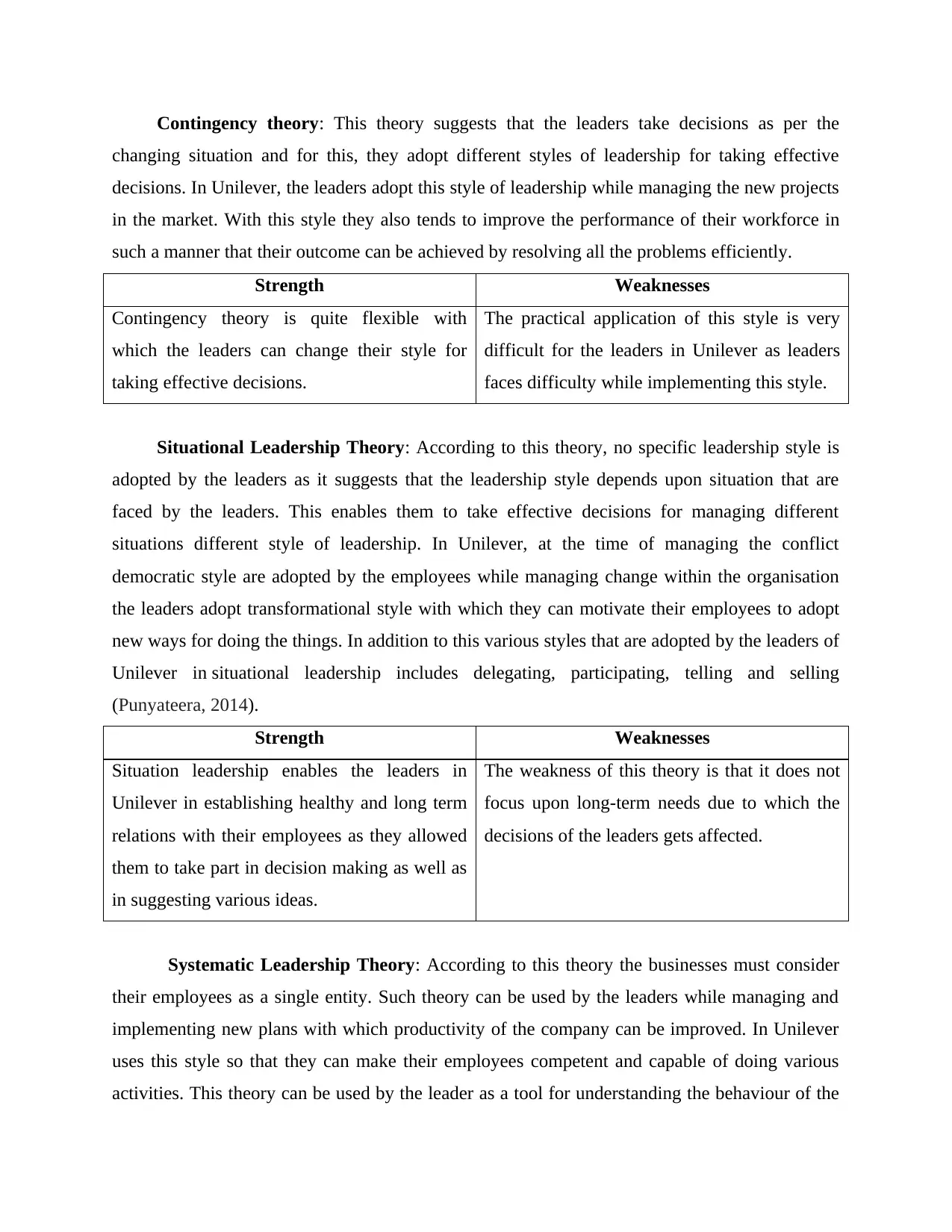
Contingency theory: This theory suggests that the leaders take decisions as per the
changing situation and for this, they adopt different styles of leadership for taking effective
decisions. In Unilever, the leaders adopt this style of leadership while managing the new projects
in the market. With this style they also tends to improve the performance of their workforce in
such a manner that their outcome can be achieved by resolving all the problems efficiently.
Strength Weaknesses
Contingency theory is quite flexible with
which the leaders can change their style for
taking effective decisions.
The practical application of this style is very
difficult for the leaders in Unilever as leaders
faces difficulty while implementing this style.
Situational Leadership Theory: According to this theory, no specific leadership style is
adopted by the leaders as it suggests that the leadership style depends upon situation that are
faced by the leaders. This enables them to take effective decisions for managing different
situations different style of leadership. In Unilever, at the time of managing the conflict
democratic style are adopted by the employees while managing change within the organisation
the leaders adopt transformational style with which they can motivate their employees to adopt
new ways for doing the things. In addition to this various styles that are adopted by the leaders of
Unilever in situational leadership includes delegating, participating, telling and selling
(Punyateera, 2014).
Strength Weaknesses
Situation leadership enables the leaders in
Unilever in establishing healthy and long term
relations with their employees as they allowed
them to take part in decision making as well as
in suggesting various ideas.
The weakness of this theory is that it does not
focus upon long-term needs due to which the
decisions of the leaders gets affected.
Systematic Leadership Theory: According to this theory the businesses must consider
their employees as a single entity. Such theory can be used by the leaders while managing and
implementing new plans with which productivity of the company can be improved. In Unilever
uses this style so that they can make their employees competent and capable of doing various
activities. This theory can be used by the leader as a tool for understanding the behaviour of the
changing situation and for this, they adopt different styles of leadership for taking effective
decisions. In Unilever, the leaders adopt this style of leadership while managing the new projects
in the market. With this style they also tends to improve the performance of their workforce in
such a manner that their outcome can be achieved by resolving all the problems efficiently.
Strength Weaknesses
Contingency theory is quite flexible with
which the leaders can change their style for
taking effective decisions.
The practical application of this style is very
difficult for the leaders in Unilever as leaders
faces difficulty while implementing this style.
Situational Leadership Theory: According to this theory, no specific leadership style is
adopted by the leaders as it suggests that the leadership style depends upon situation that are
faced by the leaders. This enables them to take effective decisions for managing different
situations different style of leadership. In Unilever, at the time of managing the conflict
democratic style are adopted by the employees while managing change within the organisation
the leaders adopt transformational style with which they can motivate their employees to adopt
new ways for doing the things. In addition to this various styles that are adopted by the leaders of
Unilever in situational leadership includes delegating, participating, telling and selling
(Punyateera, 2014).
Strength Weaknesses
Situation leadership enables the leaders in
Unilever in establishing healthy and long term
relations with their employees as they allowed
them to take part in decision making as well as
in suggesting various ideas.
The weakness of this theory is that it does not
focus upon long-term needs due to which the
decisions of the leaders gets affected.
Systematic Leadership Theory: According to this theory the businesses must consider
their employees as a single entity. Such theory can be used by the leaders while managing and
implementing new plans with which productivity of the company can be improved. In Unilever
uses this style so that they can make their employees competent and capable of doing various
activities. This theory can be used by the leader as a tool for understanding the behaviour of the
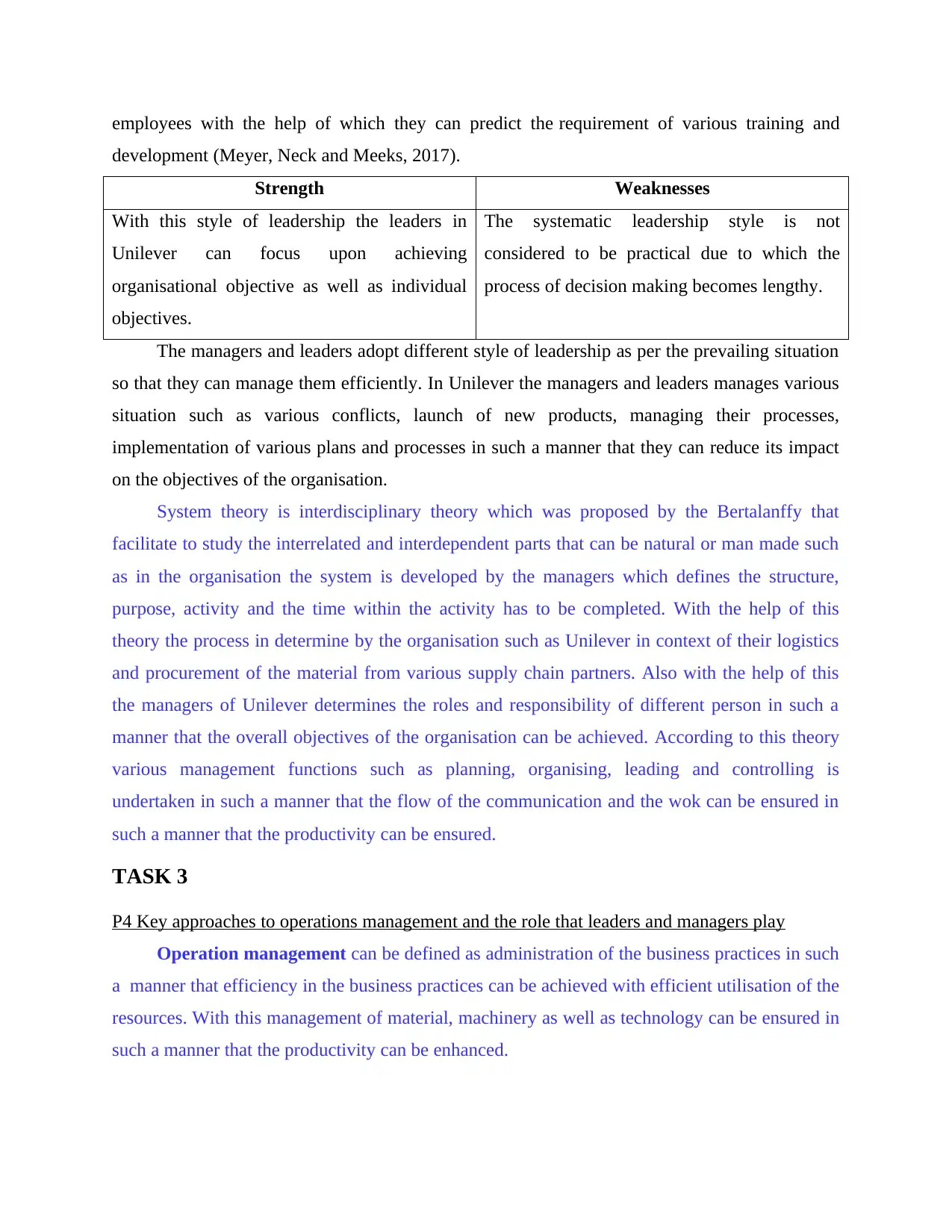
employees with the help of which they can predict the requirement of various training and
development (Meyer, Neck and Meeks, 2017).
Strength Weaknesses
With this style of leadership the leaders in
Unilever can focus upon achieving
organisational objective as well as individual
objectives.
The systematic leadership style is not
considered to be practical due to which the
process of decision making becomes lengthy.
The managers and leaders adopt different style of leadership as per the prevailing situation
so that they can manage them efficiently. In Unilever the managers and leaders manages various
situation such as various conflicts, launch of new products, managing their processes,
implementation of various plans and processes in such a manner that they can reduce its impact
on the objectives of the organisation.
System theory is interdisciplinary theory which was proposed by the Bertalanffy that
facilitate to study the interrelated and interdependent parts that can be natural or man made such
as in the organisation the system is developed by the managers which defines the structure,
purpose, activity and the time within the activity has to be completed. With the help of this
theory the process in determine by the organisation such as Unilever in context of their logistics
and procurement of the material from various supply chain partners. Also with the help of this
the managers of Unilever determines the roles and responsibility of different person in such a
manner that the overall objectives of the organisation can be achieved. According to this theory
various management functions such as planning, organising, leading and controlling is
undertaken in such a manner that the flow of the communication and the wok can be ensured in
such a manner that the productivity can be ensured.
TASK 3
P4 Key approaches to operations management and the role that leaders and managers play
Operation management can be defined as administration of the business practices in such
a manner that efficiency in the business practices can be achieved with efficient utilisation of the
resources. With this management of material, machinery as well as technology can be ensured in
such a manner that the productivity can be enhanced.
development (Meyer, Neck and Meeks, 2017).
Strength Weaknesses
With this style of leadership the leaders in
Unilever can focus upon achieving
organisational objective as well as individual
objectives.
The systematic leadership style is not
considered to be practical due to which the
process of decision making becomes lengthy.
The managers and leaders adopt different style of leadership as per the prevailing situation
so that they can manage them efficiently. In Unilever the managers and leaders manages various
situation such as various conflicts, launch of new products, managing their processes,
implementation of various plans and processes in such a manner that they can reduce its impact
on the objectives of the organisation.
System theory is interdisciplinary theory which was proposed by the Bertalanffy that
facilitate to study the interrelated and interdependent parts that can be natural or man made such
as in the organisation the system is developed by the managers which defines the structure,
purpose, activity and the time within the activity has to be completed. With the help of this
theory the process in determine by the organisation such as Unilever in context of their logistics
and procurement of the material from various supply chain partners. Also with the help of this
the managers of Unilever determines the roles and responsibility of different person in such a
manner that the overall objectives of the organisation can be achieved. According to this theory
various management functions such as planning, organising, leading and controlling is
undertaken in such a manner that the flow of the communication and the wok can be ensured in
such a manner that the productivity can be ensured.
TASK 3
P4 Key approaches to operations management and the role that leaders and managers play
Operation management can be defined as administration of the business practices in such
a manner that efficiency in the business practices can be achieved with efficient utilisation of the
resources. With this management of material, machinery as well as technology can be ensured in
such a manner that the productivity can be enhanced.
⊘ This is a preview!⊘
Do you want full access?
Subscribe today to unlock all pages.

Trusted by 1+ million students worldwide
1 out of 20
Related Documents
Your All-in-One AI-Powered Toolkit for Academic Success.
+13062052269
info@desklib.com
Available 24*7 on WhatsApp / Email
![[object Object]](/_next/static/media/star-bottom.7253800d.svg)
Unlock your academic potential
Copyright © 2020–2026 A2Z Services. All Rights Reserved. Developed and managed by ZUCOL.





